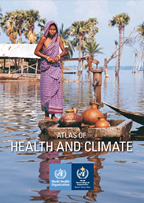Climate change and health toolkit
Building resilience of health systems and health care facilities
Building the resilience of health systems to climate change is part of a preventive approach to public health. Existing shortfalls in providing basic health services cause much of the global population to be exposed to climate-sensitive health hazards. Additional investment is needed to strengthen key functions, and to ensure that the health sector is ready to react to the challenges posed by climate change, including those posed by acute shocks such as natural disasters and disease epidemics but also to long term stresses.
Key Resources
All →WHO guidance for climate resilient and environmentally sustainable health care facilities
The aim of this guidance is to enhance the capacity of health care facilities to protect and improve the health of their target communities in an unstable...
Climate-resilient water safety plans: managing health risks associated with climate variability and change
Long-term planning for an adequate and safe supply of drinking-water should be set in the context of growing external uncertainties arising from changes...
This document presents the World Health Organization (WHO) Operational framework for building climate resilient health systems. The framework responds...
All Resources
All →WHO guidance for climate resilient and environmentally sustainable health care facilities
The aim of this guidance is to enhance the capacity of health care facilities to protect and improve the health of their target communities in an unstable...
This report provides a vital snapshot of the overall progress that governments have made in the field of health and climate change to date, as well as...
COP24 special report: health and climate change
This report is a contribution from the public health community to support the negotiations of the United Nations Framework Convention on Climate Change...
Climate-resilient water safety plans: managing health risks associated with climate variability and change
Long-term planning for an adequate and safe supply of drinking-water should be set in the context of growing external uncertainties arising from changes...
Human health and climate change in Pacific Island countries
The global community has had a “blind spot” concerning the extent of the risks posed by human-induced climate change to the well-being, health...
Lessons learned on health adaptation to climate variability and change: experiences across low- and middle-income...
Climate change exacerbates many current climate-sensitive health outcomes and has the potential to affect the ability of health system institutions and...
This document presents the World Health Organization (WHO) Operational framework for building climate resilient health systems. The framework responds...
The WHO Regional Office for Europe prepared this economic analysis tool to support adaptation planning to protect health from the negative effects of climate...

Atlas of Health and Climate
The Atlas of health and climate is a product of this unique collaboration between the meteorological and public health communities. It provides...
Public health advice on preventing health effects of heat
The most important actions to take during a heat-wave are: to avoid or reduce exposure, to communicate risks effectively, to take particular care of vulnerable...
EuroHEAT, a project coordinated by the WHO Regional Office for Europe and co-funded by the European Commission (EC) DirectorateGeneral for Health and Consumers...
Protecting health in Europe from climate change
There is now scientific consensus that climate change affects health through changing weather patterns (for example, more intense and frequent extreme...
Towards health security
This discussion paper examines recent threats to health security in the WHO European Region from communicable diseases, natural disasters, large-scale...
More resources
